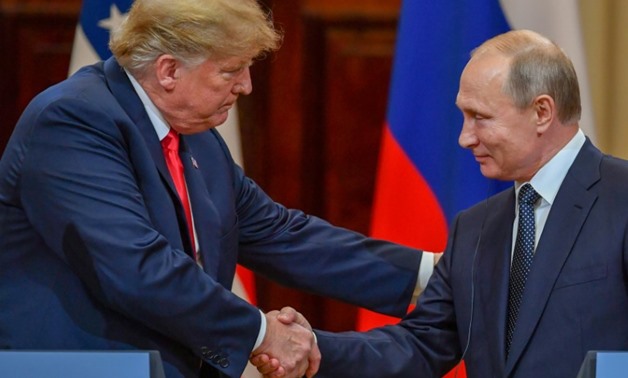
US President Donald Trump and Russia's President Vladimir Putin shake hands at the Presidential Palace in Helsinki
18 July 2018: US President Donald Trump stunned allies, gave ammunition to foes and ignited a domestic political firestorm following his meeting with Russian counterpart Vladimir Putin.
Here is a look at some of the fallout from the controversial summit.
- What now for US-Russia relations? -
Going into Monday's meeting in Helsinki, Trump said he wanted to improve relations with Russia, which he characterized as the worst they've ever been.
He had the opportunity to press Putin on any number of issues, including Russia's annexation of Crimea, the shooting down of a Malaysia Airlines jet over Ukraine and alleged meddling in the US election in 2016 to help Trump beat Hillary Clinton.
After meeting privately for two hours, the two leaders agreed to revive bilateral corporation and touted an improved relationship -- but they provided few specifics.
For some observers, that in itself was a source of relief.
They had feared Trump would agree to some sort of grand bargain on Crimea or a back-of-the-envelope deal on Syria.
Trump had vowed to seek closer ties with Russia during his election campaign, but his Helsinki appearance did little to quell suspicions of collusion between some on his election team and the Kremlin.
Those alleged ties, which Trump has repeatedly denied, are the subject of a sprawling investigation that has overshadowed Trump's time in the White House.
Standing alongside Putin, Trump seemed to give more weight to the Russian president's denials than conclusions from his own intelligence services that Russia did in fact interfere in the election -- and Putin admitted he wanted Trump to win.
The performance in Helsinki served only to deepen suspicions, Erwan Lagadec, a professor at George Washington University, told AFP, and as a result, Trump's attempt to warm US-Russia ties might ultimately backfire.
On Tuesday, Trump tried to quell the uproar at home by saying he had misspoken and does indeed accept US intelligence assessments that Russia meddled.
- Friends or foes? -
The summit capped a European trip that saw Trump lambast NATO partners, denigrate British Prime Minister Theresa May's approach to Brexit and furiously lash Germany, all amid a trade war with longtime allies.
His apparent eagerness to forge a bond with Putin, a supposed foe, stood in sharp contrast.
Trump's Europe trip "revealed that the president is now unbound, acting in accordance with his visceral beliefs about America's role in the world," said Thomas Wright, director of the Center on the United States and Europe at the Brookings Institution.
An effort by senior advisors, dubbed the "axis of adults," to contain Trump has failed and "Trump is unbound," he added.
Lagadec said Trump is determined to keep his promises, whatever their limits.
"He wants to be the anti-Obama," and erase all decisions taken by his predecessor, even if that involves upending decades of diplomatic tradition, Lagadec said.
- Republican resistance? -
Trump's approach to Putin is testing support even among some Republicans, with several speaking out to remind the president that Russia is a long-time US adversary.
"The dam is finally breaking," Republican Senator Bob Corker said on Twitter.
"As the president taxes Americans with tariffs, he pushes away our allies and further strengthens Putin," added Corker, who is retiring later this year.
Aaron David Miller, a former US diplomat now at the Woodrow Wilson Center, said Trump's news conference in Helsinki was the "foreign policy equivalent" of widely decried comments he made last year -- seeming to equate white supremacist protesters and people who turned out to counter-demonstrate -- following deadly racial violence in Charlottesville.
"Two days of infamy where an American president used moral equivalency; failed to condemn a US adversary and hate groups; and betrayed US values/interests," Miller said.
Lagadec even suggested the episode could change "the internal balance of American politics, forcing Congress to regain control over some of America's foreign policy.
But with the fate of many Republican politicians' tied to Trump's popularity with his base, any attempt to check the president in the Republican-controlled Congress would likely flounder.


Comments
Leave a Comment